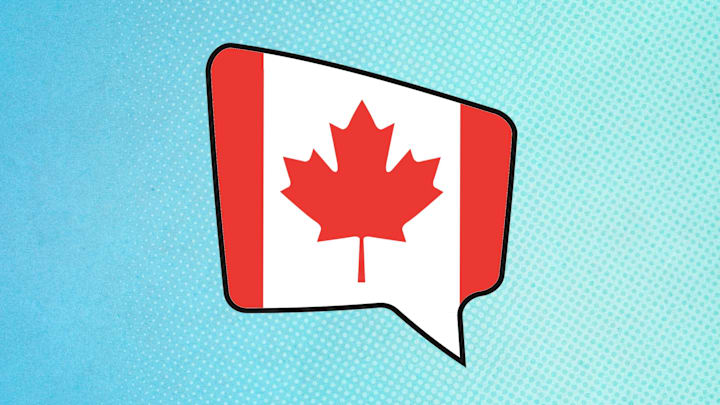It’s often said that Great Britain and the United States are two countries separated by a common language. The same applies to the United States and Canada, especially when it comes to slang. While Canadians are typically chided aboot their accents and for saying “eh?,” Canadian slang is largely unheard of south of the border. So, dear Americans, here are a few of the most common slang words that will have you speaking Canuck in no time.
1. Pogey
The term is found mainly in the Maritime provinces of Atlantic Canada and in parts of Ontario, and is used to describe unemployment insurance or social assistance. The origin of pogey in Canadian usage is somewhat unclear, although some have suggested it was a general North American term in the late 19th century meaning workhouse or poorhouse.
Usage: “I’m taking the winter off and going on pogey!”
2. Toque/Tuque
A wool knit cap commonly worn in winter. The Canadian sense of the word originated in the late 1800s during the French fur trade with indigenous people in Quebec and parts of western Canada. But today, toque is commonly used throughout the country. (Note that a toque in Canada is not be confused with that tall white chef’s hat, which is called a toque blanche.)
Usage: “It's really cold out there! Don’t forget to wear your toque!”
3. and 4. Loonie and Twoonie
The loonie is the gold-colored $1 coin that features a loon on one side and Queen Elizabeth II on the other. It was introduced in 1987 and replaced the $1 bill, which is no longer in circulation. The $2 coin came into circulation in 1996, and usually features a polar bear on the side not bearing the likeness of the Queen. It was named a twoonie after the loonie—because if something works, why not just go with it?
Usage: “Do you have change for a twoonie?” “Sorry, I only have a loonie on me.”
5. Give'r/Giv'n'er
To give it all you’ve got, to go above and beyond what was expected, or to go really, really fast. The word seems to be found in central and western regions of Canada such as Manitoba, Saskatchewan, and Alberta. The term was also popularized in the 2002 move Fubar, which was set in Alberta:
Farrel Mitchener: “Can you maybe explain given’r? What exactly does that mean?”
Dean Murdoch: “Give’r. You just go out and you give’r. You keep working hard.”
6. Double-Double
If you ever get a caffeine fix north of the border and find yourself in line at “Timmies” (slang for popular coffee chain Tim Hortons), don’t be surprised if you hear someone order a double-double (or even a triple-triple). Not to be confused with a burger from the California chain In-N-Out Burger, a double-double is Canadian slang for coffee with two creams and two teaspoons of sugar. In fact, it’s so common people often order double-doubles at non-Timmies cafes as well.
7. Stagette
This term is largely used in Manitoba and parts of Ontario, as well as elsewhere in the country, to describe what Americans call a bachelorette party. The term stag night (for bachelor party) originated in the UK, with hen night used to describe the party for the bride and her friends. Apparently, Canadians avoided the term hen and preferred to add the “ette” on the end of “stag” to give it a slightly French feel.
8. Booter
A booter is when you step into a puddle or snow bank deep enough that the water flows into your boot (or shoe). Canadians are well-versed in this term (often found in western parts of the country), which is especially used during a heavy snowfall or a slow spring melt. The cold water creeping into your boots from the top and submerging your socks is an uncomfortable memory that can haunt a person for years.
Usage: “Hey watch out for that giant puddle, I just got a booter!”
9. Grad
Grad is akin to the Canadian version of prom, but with fewer formalities involved. Some high schools may have a “grad week” complete with activities, but the actual grad involves the cap and gown ceremony in the morning followed by a formal dinner and dance. Unlike prom, there is usually no “Grad King or Queen” crowned at the end of the night.
10. May Two-Four
May two-four is slang in some parts of Canada for Victoria Day, the Monday of a long weekend honoring Queen Victoria’s birthday on May 24. The use of May two-four rather than saying the twenty-fourth is an inside joke referring to what Canadians call a flat, or 24 bottles of beer. The May long weekend signals the first signs of summer, which Canadians get very excited about. They often head to a cottage or cabin armed with a two-four of beer, as well as an arsenal of mosquito spray and mouse traps.
11. and 12. Mickey and Texas Mickey
Similar to a two-four, Canadians have their own way to describe certain sizes of hard alcohol. A mickey refers to a 375ml (Canada uses metric, remember) bottle of alcohol, such as rum, vodka, or Canadian rye whiskey. Despite the name, a Texas mickey is 100 percent Canadian. It’s an oversized 3-liter bottle of alcohol commonly found at university house parties (similar to college frat parties in the U.S.) and comes with a pump you attach at the top. Once finished, the Texas mickey bottle is often put on display, so all your house-mates can admire the cause of your liver damage.
A version of this story ran in 2016; it has been updated for 2022.
